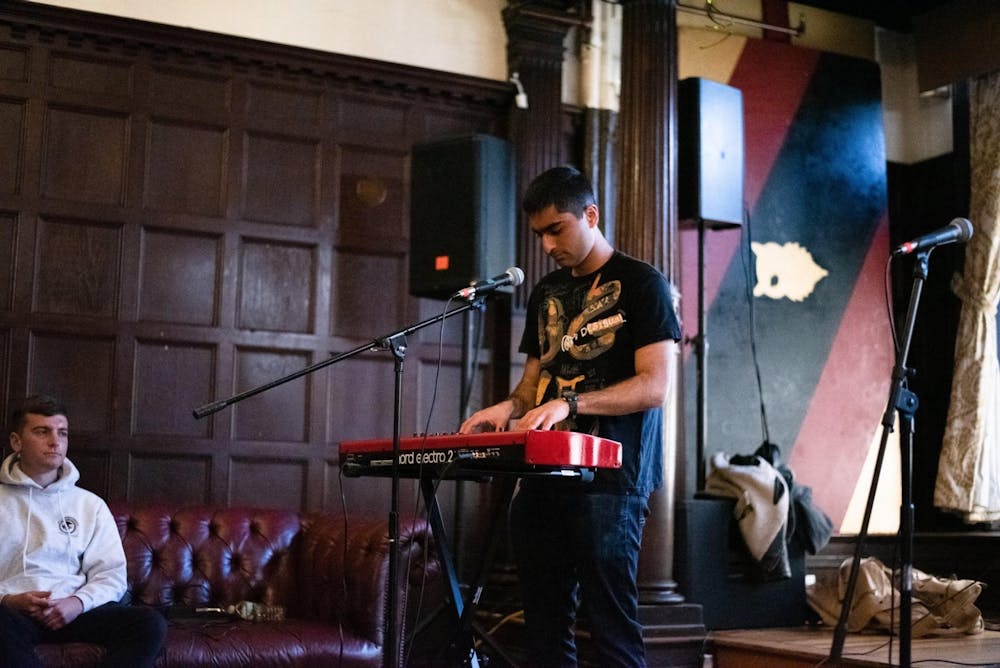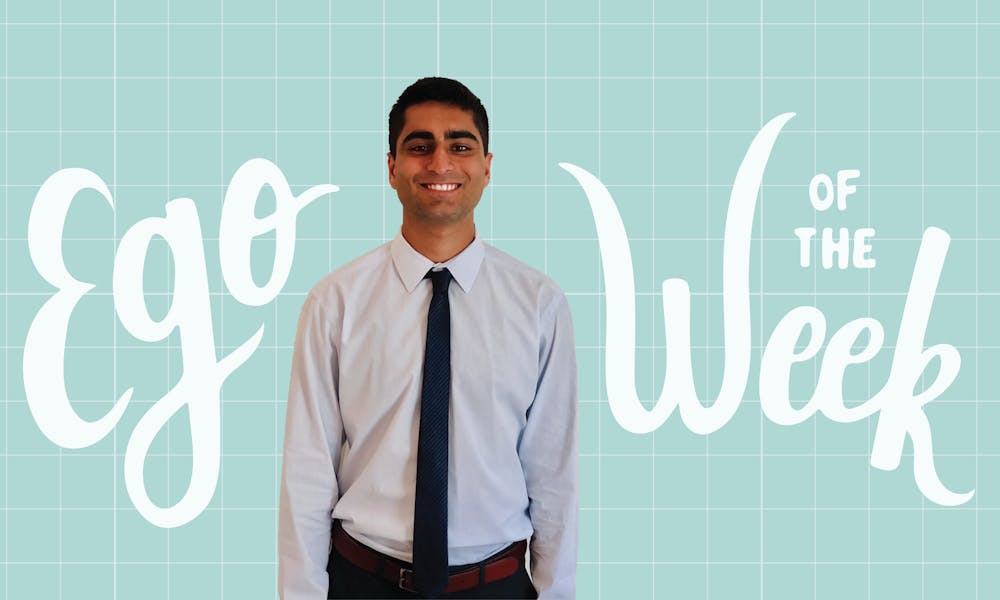Name: Ranvir Bhatia
Hometown: Livingston, New Jersey
Major: Biochemistry, Biophysics, Master’s in Chemistry (The Vagelos Scholars Program in the Molecular Life Sciences)
Activities: Captain of Penn Frisbee’s B–Team, Head of Band Dance Music, Penn Jazz Combos, Penn Baroque Ensemble, Volunteer at the United Community Clinic (UCC) and the After School Arts Program at the Platt Student Performing Arts House, Jazz and Grooves.
34th Street: What made you want to do the Vagelos Program when you came to Penn?
Ranvir Bhatia: I was always big on research because I had a high school bio teacher that was amazing. She would have this phone cord and then she would fold it up like a protein and then unfold how a protein denatures. She really sparked my curiosity and so I did some research in high school. I thought I [wanted] to be a researcher and make drugs. I did a lot of that in college, but then I realized that medicine would lead to a better life.
Street: At what point in your college career did you consider a future in medicine?
RB: Mainly through volunteering at the UCC Clinic. I thought I was going to do a MD–PhD but, while at the clinic, it was really cool to interact with people and learn about their life stories, especially the West Philadelphia community. There’s a lot of unmet medical needs, a lot of them don’t have insurance. So being able to have that impact or work towards that impact was really rewarding. In a lab you can work on something for years, and you may not impact anyone at all, but in medicine, in the day–to–day, you can make someone feel better. It’s cool, you get to hear a bunch of people’s stories.
Street: What’s the experience of being a pre–med and science student been like for you?
RB: My favorite part about being a science student is when everything comes together. I took this one class, “Principles of Drug Action,” and another class, “Medicinal Chemistry,” and basically the whole idea behind pharmacology uses everything you’ve learned before. It uses biochemistry, organic chemistry, biology, so it’s cool to use those techniques in order to create a compound to do whatever you need it to do in the body, that can cure disease. For example, for any enzyme, you have an active site and you have amino acids in there. The one class I was in, we had these compounds that had a certain shape to fit into the enzymes. We had to optimize that shape and think about fit, while at the same time thinking what are the consequences of inhibiting this enzyme in the cell and in the organ. That’s really cool when everything comes together and you can use multiple disciplines to do something you want to do.
As far as being a pre–med student there was this one class that I took that was really cool. It was a Penn Global Seminar ("Culture, Health and Development in Ghana"), so I went to Ghana over spring break. It was a nursing class so the focus was on culture, health, and development in Ghana through the lens of sickle cell anemia and malaria. I went in to it as a science type of guy, like ooh sickle cell anemia! But I came out of it learning more about social determinants of health and cultural determinants of health. One thing that really struck me was there was this American–Ghanian doctor who came into our class one day who just talked about sickle cell and other things. One thing she mentioned was that there were times when she went to the pharmacy to fill her pain medication for sickle cell and the pharmacist denied her. Apparently it’s a common thing, where people of color go to pharmacies to get pain medication and their prescriptions are refused to be filled. Learning about that, and learning that it’s more than science. There’s a lot more that we can do to improve the quality of healthcare for people. It’s shifted my career interests.
Street: What made you get involved with Frisbee in college?
RB: I ran track in high school, and spending time with teammates and working together was huge. In running relays, you have to push yourself hard because your teammates were relying on you and in the end you’re gasping for air and throwing up in a trash can. Having that reliance on each other is cool, it makes you come together and have a strong connection. When I came to college, I didn’t have that because there was no more track. I wasn’t fast enough to run here. So I wanted a sport like that—for the team. Frisbee was cool because it was like that, there was that team mentality, but it was also super chill. It’s not as intense, and it’s been a lot of fun.
Street: What is it like being on the Frisbee team now?
RB: I became captain of the B–team in my sophomore year and then I stepped down my junior year because I thought it would be cool to pass the torch to the young ones and I thought that I would make the A–team, but I didn’t really work at it and I didn’t make the A–team. I realized this year that I should probably be captain again, so now I’m captain of the B-team again.
What’s it like being the captain of the team?
RB: Initially I was the goofy captain, I would say some nonsense at half–time just to get the troops riled up. That’s actually why I [ended] up stepping down because there was this other player that did everything right. Very talented on the field and he could instruct the others. I really was just keeping everyone’s spirits up. So I wrote this speech that was delivered on my behalf at the new captain’s elections and this speech was basically nominating this new kid to be captain and then he got elected captain. This year I’m more mature in a sense. I want the team to do well. I want to educate the younger ones. You learn and you grow up and you realize it’s not just all about making sure people are having fun, but also making sure that we do what we have to do in order to be successful.
Street: What’s been your favorite part of being on the Frisbee team?
RB: Every year I’ve organized a song for the B–team. The B–team is named null, so we call them null anthems. So we’ve had three so far. This year because it’s my last year I have to do something crazy for it. It’s fun getting people together. I make the beat and then I just rap jokes over it. We perform it at the rookie talent show in the spring and during one of the last tournaments someone will play it on a speaker. It’s a cool tradition.

Street: Do you think the tradition will continue once you graduate?
RB: I might have to send them beats and write for them the next couple years. I hope it does.
Street: What role has music played in your Penn experience?
RM: I’d say it’s been very central. I’ve probably spent too much time doing it. There’s so much talent here and there’s so many people doing awesome things with it. Being able to work with them and collaborate and find new avenues has been so much fun. I’ve been rapping since sixth grade. It started off with school projects, like in sixth grade I performed this rap in front of the entire school about Apollo–11. At the time I was really shy and I didn’t really have friends. I feel like rapping and performing in front of people really helped open myself up and communicate with people. I did that through middle school and high school, and then in high school I started playing in the jazz band and that’s when I started making the links. I saw people like Kendrick Lamar and Childish Gambino and J. Cole, and I was like this is cool. That’s when I started combining the two.
Street: What’s your favorite part of making music?
RB: At first it was the lyrics, but for the last three years it’s the beats themselves. I always start with piano chords, then I throw in baseline drums, and then I get other people in like a guitar player, a saxophone player, enhancing it. The live sound is always the ideal, but it’s cool to combine the live sound with trap flavors and drums.
Street: What made you get involved with After School Arts Program at the Platt?
RB: I did the West Philadelphia Tutoring Project for a little bit and it was really cool learning from these kid’s lives and learning about their experiences. They make you more aware and understanding of what’s happening around you and how you were fortunate because you grew up in a fancy town in New Jersey and you had everything. Every time I went volunteering, instead of doing the math and reading that was assigned, I’d just do fun stuff. Once, I took one student to play basketball. I wanted to do something fun and that I was passionate about with these kids. One thing is music and a lot of these kids are in under–resourced public schools focus on standardized testing, like math or reading, and so they leave behind music and all these other programs. When I found about this, I thought it was really cool to instill that. The kids were really receptive to it.
What are your plans after Penn?
I’m currently applying to medical school so wherever they take me I’ll go. So that’s the plan, medical school and then we’ll see what I get into from there. There’s two fields I’m interested in. One is translational oncology and discovering new therapies and drugs for new types of cancers. Being able to give patients a therapy I’ve been involved with developing would be super cool. The other is community health, primary care, something in that sense.
Lightning Round
Favorite class at Penn?
Definitely “(NURS 343) Culture, Health and Development in Ghana”
Song on repeat right now?
“Prayers to the Trap God” by Roddy Ricch
Favorite late–night food spot on campus?
We lived on 42nd last year and we’d go to 7–Eleven. When we go to 7–Eleven and it’s late at night we’re just buying all the taquitos, so we buy seven or eight taquitos.
Any pre–tournament rituals or superstitions?
Music. Listening to chill stuff like Anderson .Paak because if I listen to something hype it would stress me out.
Proudest accomplishment during your time at Penn?
With this one kid at the after–school arts program we made a song and we got to perform at this performance at the end. It’s on SoundCloud now.
There’s two types of people at Penn…
The people that you know and you see who will go out of their way to give you a hug or dap you up and the people who know you and won’t look at you at all.
Which one of those people are you?
I’m the first one.

